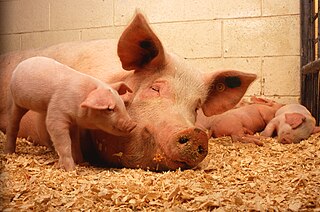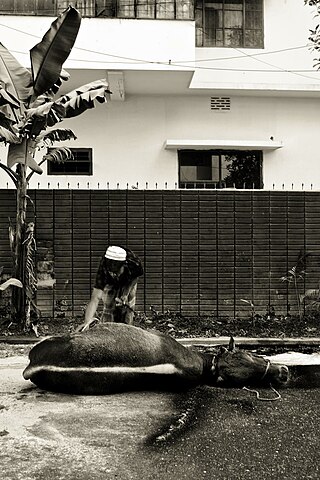Related Research Articles
Kashrut is a set of dietary laws dealing with the foods that Jewish people are permitted to eat and how those foods must be prepared according to Jewish law. Food that may be consumed is deemed kosher,from the Ashkenazi pronunciation of the term that in Sephardic or Modern Hebrew is pronounced kashér,meaning "fit". Food that may not be consumed,however,is deemed treif,also spelled treyf.
Exsanguination is death caused by loss of blood. Depending upon the health of the individual,people usually die from losing half to two-thirds of their blood;a loss of roughly one-third of the blood volume is considered very serious. Even a single deep cut can warrant suturing and hospitalization,especially if trauma,a vein or artery,or another comorbidity is involved. The word comes from the Latin 'sanguis',meaning blood.

Jonathan Safran Foer is an American novelist. He is known for his novels Everything Is Illuminated (2002),Extremely Loud &Incredibly Close (2005),Here I Am (2016),and for his non-fiction works Eating Animals (2009) and We Are the Weather:Saving the Planet Begins at Breakfast (2019). He teaches creative writing at New York University.

In Judaism,shechita is ritual slaughtering of certain mammals and birds for food according to kashrut.
Kosher foods are foods that conform to the Jewish dietary regulations of kashrut. The laws of kashrut apply to food derived from living creatures and kosher foods are restricted to certain types of mammals,birds and fish meeting specific criteria;the flesh of any animals that do not meet these criteria is forbidden by the dietary laws. Furthermore,kosher mammals and birds must be slaughtered according to a process known as shechita and their blood may never be consumed and must be removed from the meat by a process of salting and soaking in water for the meat to be permissible for use. All plant-based products,including fruits,vegetables,grains,herbs and spices,are intrinsically kosher,although certain produce grown in the Land of Israel is subjected to other requirements,such as tithing,before it may be consumed.

Cholent or Schalet is a traditional slow-simmering Sabbath stew in Jewish cuisine that was developed by Ashkenazi Jews first in France and later Germany,and is first mentioned in the 12th century. It is related to and is thought to have been derived from hamin,a similar Sabbath stew that emerged in Spain among Sephardic Jews and made its way to France by way of Provence.
Some people do not eat various specific foods and beverages in conformity with various religious,cultural,legal or other societal prohibitions. Many of these prohibitions constitute taboos. Many food taboos and other prohibitions forbid the meat of a particular animal,including mammals,rodents,reptiles,amphibians,fish,molluscs,crustaceans and insects,which may relate to a disgust response being more often associated with meats than plant-based foods. Some prohibitions are specific to a particular part or excretion of an animal,while others forgo the consumption of plants or fungi.

The practice of vegetarianism is strongly linked with a number of religious traditions worldwide. These include religions that originated in India,such as Hinduism,Jainism,Buddhism,and Sikhism. With close to 85% of India's billion-plus population practicing these religions,India remains the country with the highest number of vegetarians in the world.

Pork is a food taboo among Jews,Muslims,and some Christian denominations. Swine were prohibited in ancient Syria and Phoenicia,and the pig and its flesh represented a taboo observed,Strabo noted,at Comana in Pontus. A lost poem of Hermesianax,reported centuries later by the traveller Pausanias,reported an etiological myth of Attis destroyed by a supernatural boar to account for the fact that "in consequence of these events the Galatians who inhabit Pessinous do not touch pork". In Abrahamic religions,eating pig flesh is clearly forbidden by Jewish (kashrut),Islamic (halal) and Adventist dietary laws.
Early criticism of Judaism and its texts,laws,and practices originated in inter-faith polemics between Christianity and Judaism. Important disputations in the Middle Ages gave rise to widely publicized criticisms. Modern criticisms also reflect the inter-branch Jewish schisms between Orthodox Judaism,Conservative Judaism,and Reform Judaism.

In Islamic law,dhabihah,also spelled zabiha,is the prescribed method of slaughter for halal animals. It consists of a swift,deep incision to the throat with a very sharp knife,cutting the wind pipe,jugular veins and carotid arteries on both sides but leaving the spinal cord intact. The butcher is also required to call upon the name of Allah (Bismillah) individually for each animal.
The Islamic dietary laws (halal) and the Jewish dietary laws are both quite detailed,and contain both points of similarity and discord. Both are the dietary laws and described in distinct religious texts:an explanation of the Islamic code of law found in the Quran and Sunnah and the Jewish code of laws found in the Torah,Talmud and Shulchan Aruch.

The legal aspects of ritual slaughter include the regulation of slaughterhouses,butchers,and religious personnel involved with traditional shechita (Jewish) and dhabiha (Islamic). Regulations also may extend to butchery products sold in accordance with kashrut and halal religious law. Governments regulate ritual slaughter,primarily through legislation and administrative law. In addition,compliance with oversight of ritual slaughter is monitored by governmental agencies and,on occasion,contested in litigation.
Jhatka,or Jhataka,is the meat from an animal killed by a single strike of a sword or axe to sever the head within the Sikh religion,which kills the animal almost instantly as opposed to other forms of slaughter. This type of slaughter is preferred by most Sikhs,as well as meat-consuming Hindus and Buddhists. Also within this method of butchering the animal must not be scared or shaken before the slaughter.
Ritual slaughter is the practice of slaughtering livestock for meat in the context of a ritual. Ritual slaughter involves a prescribed practice of slaughtering an animal for food production purposes.

Eating Animals is the third book by the American novelist Jonathan Safran Foer,published in 2009. A New York Times best-seller,Eating Animals provides a dense discussion of what it means to eat animals in an industrialized world. It was written in close collaboration with Farm Forward,a US nonprofit organization promoting veganism and sustainable agriculture.
Tza'ar ba'alei chayim,literally "suffering of living creatures",is a Jewish commandment which bans causing animals unnecessary suffering. This concept is not clearly enunciated in the written Torah,but was accepted by the Talmud as being a biblical mandate. It is linked in the Talmud from the biblical law requiring people to assist in unloading burdens from animals.
Jewish vegetarianism is a commitment to vegetarianism that is connected to Judaism,Jewish ethics or Jewish identity. Jewish vegetarians often cite Jewish principles regarding animal welfare,environmental ethics,moral character,and health as reasons for adopting a vegetarian or vegan diet.

Asa Keisar is an Israeli Jewish religious scholar,rabbi,scribe,and advocate for veganism. He has given many public lectures across Israel in support of veganism as both a Torah imperative to avoid cruelty to animals,as well as it being the Torah's ideal for mankind.
Farm Forward is a 501(c)(3) nonprofit whose mission is to promote conscientious eating,reduce farmed animal suffering,and advance sustainable agriculture. Farm Forward aims to eliminate the most harmful practices in intensive animal agriculture,increase the market share of humane and sustainable animal agriculture,and raise awareness about the cultural significance of animal agriculture.
References
- 1 2 "USD Directory - - Aaron Gross - University of San Diego". www.sandiego.edu. Retrieved 2019-04-09.
- ↑ Chottiner, Lee (2018-12-20). "Society of Jewish Ethics holds meeting here; sessions spotlight today's issues". Jewish Community of Louisville. Retrieved 2019-04-09.
- 1 2 Kolbert, Elizabeth (2009-11-02). "Flesh of Your Flesh". The New Yorker. ISSN 0028-792X . Retrieved 2019-04-09.
- 1 2 "Food Conference Presenter Spotlight: Aaron Gross, Farmed Animal Welfare Advocate and CEO, Farm Forward". Hazon. 2011-06-17. Retrieved 2019-04-09.
- ↑ "Jonathan Safran Foer and Aaron Gross on (Not) Eating Animals - Chicago Humanities Festival". www.chicagohumanities.org. Retrieved 2019-04-09.